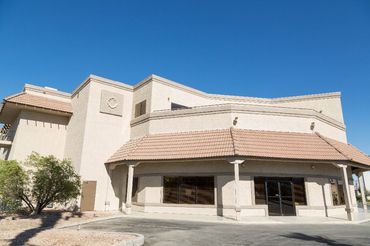
Drug & Alcohol Rehab Centers near Las Vegas, NV
In the vibrant city of Las Vegas, Nevada, taking the first step towards recovery from substance use disorder is crucial. It’s essential to explore treatment options and payment methods beforehand to ensure a successful journey towards a healthier future.
Treatment Centers near Las Vegas, NV
All Treatment Centers near Las Vegas, NV
Are You Covered For Treatment?
- Reno Rehabs
- Elko Rehabs
- North Las Vegas Rehabs
- Henderson Rehabs
- Fallon Rehabs
- Carson City Rehabs
- Dayton Rehabs
- Sparks Rehabs
- Pahrump Rehabs
Information About Rehab in Las Vegas
Latest Reviews
Latest Reviews of Rehabs in Nevada
Desert Hope Outpatient Center
This is a great facility. Full of wonderful, helpful people.
U.S. VETS Las Vegas
Free treatment for Homeless Veterans with good relations with local agencies and job assistance when a client completes the program. Food could be better. Good program to help Homeless Veterans, such as myself to get off the streets. I am receiving HUD VASH which pays 100% of my rent in a little studio apt. for over three years. Also has good job placement resources to help find a job.
Area Information
Las Vegas, often referred to as the “Entertainment Capital of the World,” is a dazzling and dynamic city nestled in the Mojave Desert of Nevada. This iconic destination is renowned for its vibrant nightlife, world-class entertainment, and a myriad of attractions. Home to a diverse population of over 600,000 residents,1 Las Vegas boasts a unique blend of cultures and backgrounds that contribute to its distinctive character. Beyond the famous Las Vegas Strip, the city offers a wide range of activities, from outdoor adventures in the nearby Red Rock Canyon and Lake Mead to the cultural experiences found in its museums, galleries, and thriving culinary scene. With its desert climate and an average of 300 days of sunshine per year, Las Vegas is a year-round destination for visitors and a dynamic place to live for its residents.
Substance Misuse and Addiction in Las Vegas
Known as “Sin City,” Las Vegas undeniably grapples with the pervasive issue of substance misuse and addiction, much like many other communities across the nation. Nevada’s experience closely mirrors national trends in this regard. The state has witnessed a significant increase in its drug overdose death rate, soaring from 11.5 per 100,000 people in 1999 to a troubling 21.7 per 100,000 people in 2016.2
Drug and Alcohol Rehab
Rehabilitation centers provide a range of options and programs to assist individuals in their recovery journey from addiction. These dedicated facilities offer tailored support through various approaches, helping individuals regain control of their lives and achieve lasting sobriety.
What Happens in Drug and Alcohol Rehab?
Entering rehab is a deeply personal journey, and the path to recovery can vary widely from person to person. That’s why rehabilitation facilities offer a range of different stages of treatment to meet individuals where they are in their recovery process. These stages typically include detoxification, inpatient treatment, outpatient programs, and aftercare support. Each level of care is designed to address the specific needs and circumstances of the individual, ensuring that they receive the right level of support at every step of their recovery journey.
Detox Programs
Detoxification programs, often the initial phase of addiction treatment, are essential for individuals seeking recovery from substance use disorders. These programs are medically monitored environments where individuals undergo the process of safely and gradually eliminating drugs or alcohol from their bodies. What sets detox programs apart is their ability to provide vital medical support, including medications when necessary, to help manage the often uncomfortable and sometimes dangerous withdrawal symptoms associated with certain substances. These medications can alleviate cravings, minimize discomfort, and reduce the risk of severe complications during the detox process. By providing a safe and supportive environment, detox programs lay a strong foundation for continued success in treatment.
How Long Is Detox in Rehab?
The duration of a detox program typically spans anywhere from 3 to 7 days, although this timeframe can vary based on several factors. The specific substance of abuse, the individual’s overall health, the severity of their addiction, and their response to treatment all influence the length of the detoxification process.
Inpatient Drug and Alcohol Rehab
Inpatient drug and alcohol rehab programs are intensive and structured treatment settings designed to provide individuals with the comprehensive support necessary for their recovery journey. These programs typically involve a stay at a residential facility for a specified period, which can range from 30-day programs or be extended 60 or 90-day options, depending on the individual’s needs and progress.
At the core of inpatient drug rehab is therapy, which plays a pivotal role in helping patients stay on track with their healing process. Through a combination of individual counseling, group therapy sessions, and specialized treatment modalities, individuals can address the root causes of their addiction, develop coping strategies, and work through any co-occurring mental health disorders that may be complicating their recovery. This holistic approach not only helps individuals achieve and maintain sobriety but also equips them with the tools needed for a successful, long-term recovery journey.
Outpatient Drug and Alcohol Rehab
Outpatient drug and alcohol rehab programs provide a flexible and effective approach to addiction treatment for individuals who don’t require the level of intensity found in inpatient care or who need ongoing support after completing an inpatient program. These programs allow participants to receive treatment while living at home and maintaining their daily responsibilities, such as work or family commitments. Outpatient drug rehab typically involves regular therapy sessions, group counseling, and educational workshops, all of which are tailored to address the specific needs of each individual.
One of the key focuses of outpatient drug and alcohol rehab is teaching participants valuable tools for aftercare and relapse prevention. These programs equip individuals with coping strategies, life skills, and mindfulness techniques to manage triggers, stressors, and cravings in their daily lives. Through individual and group therapy sessions, participants learn to identify and address the underlying causes of their addiction, develop a strong support network, and create a personalized relapse prevention plan. By offering ongoing guidance and support, outpatient drug rehab helps individuals not only achieve initial sobriety but also maintain it over the long term, promoting lasting recovery and improved overall well-being.
How Much Does Rehab Cost?
Paying for rehab can indeed be daunting and feel like a significant burden, but it’s crucial to understand that financial concerns should not deter anyone from seeking help. There are various options available to make addiction treatment more accessible, such as:
- Payment Plans
- Government Grants and Scholarships
- Free Rehab
- State-Funded Rehab
Does Insurance Cover Drug and Alcohol Rehab?
Drug rehab insurance can provide crucial financial support by covering at least a portion of the costs associated with addiction treatment. While the extent of coverage varies depending on the insurance plan, it can significantly ease the financial burden, making quality rehab programs more accessible to those in need. Widely accepted insurances include, but are not limited to:
Sources
- United States Census Bureau. July 1, 2022. Las Vegas, Nevada.
- Andrea Blin. 2017. “Addiction and Substance Abuse in Nevada.” In The Social Health of Nevada: Leading Indicators and Quality of Life in the Silver State. Las Vegas, NV: UNLV Center for Democratic Culture.



















